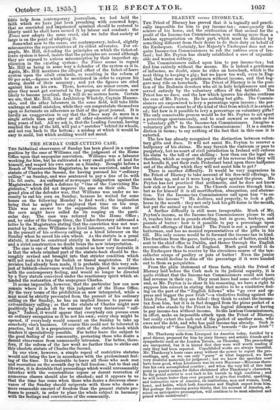BLARNEY versus INCOME-TAX.
THE Priest of Blarney has proved that it is logically and practi- cally impossible for him to pay ineome-tax ; consequently the seizure of his horse, and the confiscation of that animal for the profit of the Income-tax Commissioners, was nothing more than a lawless appropriation on their part, which must be dictated by something different from their desire to do their duty on behalf of the Exchequer. Certainly, her Majesty's Exchequer does not re- quire Income-tax Commissioners to rob the natives even of Ire- land ; but Mr. Peyton has clearly established a case of unjustifi- able and wanton robbery. The Commissioners called upon him to pay income-tax ; but find him entirely without the means. He is indeed a gentleman of influence, no doubt, since he rides on horseback, which is the next thing to keeping a gig; but we know too well, even in Eng- land, that there may be gentlemen without income, and that beg- gars may ride on horseback. The Priest of Blarney is in the posi- tion of the Brahmin devotees who sit in holy helplessness and are served entirely by the voluntary offices of the faithful. The Priest has no dues, and the law which ignores his claims confirms the case of Mr. Peyton. He has nothing but gifts. The Commis- sioners are empowered to levy a percentage upon income ; the per- centage of course must be of the kind of that from which it is extract- ed; but how is it possible to levy a percentage on voluntary gifts? The only conceivable process would be for Mr. Peyton to set apart a percentage spontaneously, and to send onward so much as his " voluntary gift" to the Income-tax Commissioners. Imagine a voluntary gift to the Income-tax Commissioners ! It is a contra- diction in terms; to say nothing of the fact that in this case it is extorted.
The law has already recognized the distinction between volun- tary gifts and dues. It will not assist Mr. Peyton to recover a halfpenny of his claims. He may furnish the viaticum or pass to purgatory, but no court of civil jurisdiction in Ireland will enforce his claim to the toll of one shilling: how then can the legal au- thorities, 'which so respect the purity of his revenue that they will not handle it, put their rude Protestant hand upon three-halfpence out of the shilling which they will not assist him to get ? There is another difficulty. It would be very ungracious in the Priest of Blarney to take account of hie free-will offerings, to sum them up, and as it were keep a ledger against the pious. ifr. Peyton has not practised that arithmetic, and he does not know how rich or how poor he is. The Church receives through him ; but as for himself it is all mortification, abnegation, and abstrac- tion. Yet the Income-tax Commissioners call upon him "to es- timate his income "! He declines, and properly, to look a gift- horse in the mouth : they not only look his gift-horse in the mouth, but put the animal up to auction. A further difficulty is still more insuperable. Much of Mr. Peyton's income, as the Income-tax Commissioners please to call it, reaches him not in pounds sterling, but in geese, turkeys, and pounds of butter : how is it possible to pay a percentage upon free-will offerings of that kind ? The Priest is not a poulterer or butterman, and has no monied representatives of the gifts in his till. His only course would be to forward the income-tax in kind. The fractions from the geese, turkeys, or pounds of butter, could be sent to the chief office in Dublin, and thence through the English revenue-office to the Bank of England. Much good would it do the Exchequer thus to receive by the circuitous course of the tax- collector scraps of poultry or pats of butter! Even the junior clerks would decline to dine off the percentage if it were handed out to them as perquisites. From the plain statement of these facts, which the Priest of Blarney laid before the Cork mob in its judicial capacity, it is quite evident that the Income-tax Commissioners could not have had revenue in their eye. They must have had some other object; and, as Mr. Peyton is so clear in his reasoning, we have a right to suppose him correct in stating that motive to be a vindictive feel- ing on the part of the "English fellows" who "go over and op- press and beggar the poor Irish "—a vindictive feeling against the Irish Priest. But they are foiled : they think to extort the income-
tax from him, but it is in fact dragged from the pious pocket of a friend who stands by the priest in his logical dilemma of having to pay income-tax without income. So the lawless Commissioners, in effect, make an impossible attack upon the Priest of Blarney, but really extort the cash out of the pocket of another man, who i owes not the debt, and who has paid income-tax already. Such is the atrocity of " those English fellows" towards " the poor Irish"!


























 Previous page
Previous page